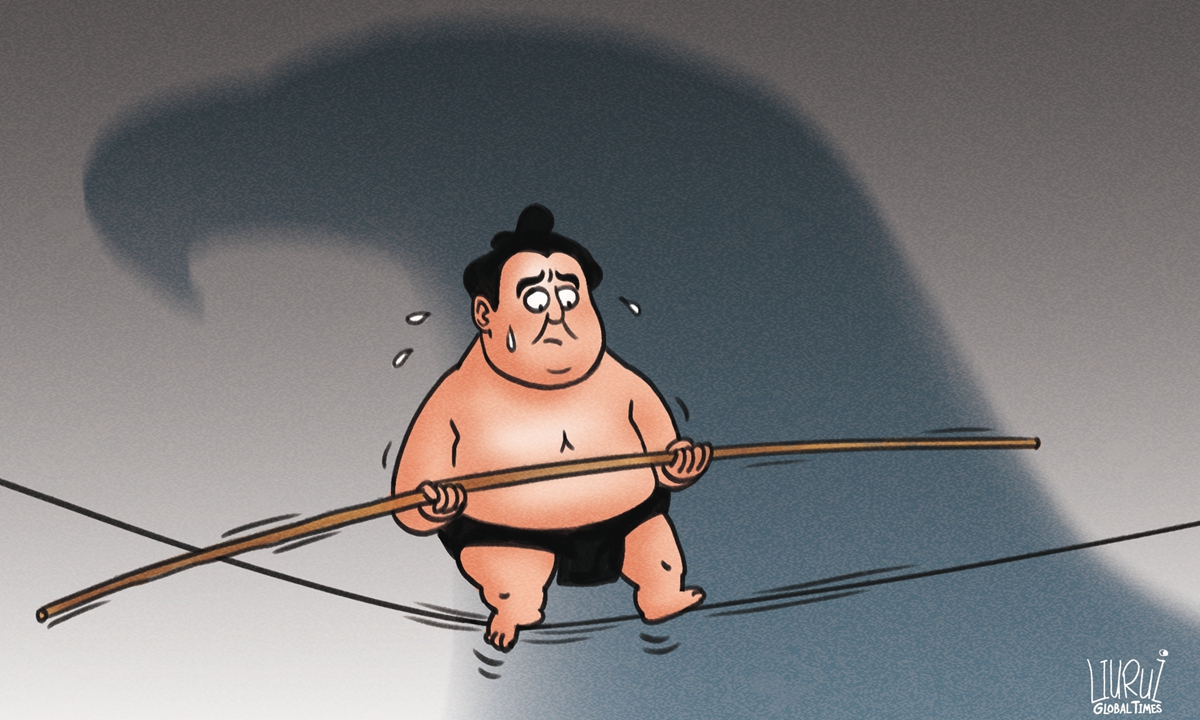Deploying aggressive US weapons will damage Japan's security situation
By Wei Dongxu Source: Global Times Published: 2020/8/19 18:53:40

Illustration: Liu Rui/GT
Washington will talk with its Asian allies about the deployment of mid-range missiles to counter an "immediate threat" posed by Beijing, Marshall Billingslea, US top arms control negotiator, told Nikkei on Friday. He singled out Japan, saying these weapons are, "exactly the kind of defensive capability that countries such as Japan will want and will need for the future."
The US has been looking to Japan for the deployment of mid-range missiles since its withdrawal from the Intermediate-Range Nuclear Forces Treaty in August 2019. Washington has put forward this proposal again with the aim to strengthen its offensive capabilities in the Western Pacific region.
Washington believes that traditional advantages of the US Navy and the US Air Force are shrinking due to its strategic rivals' increase in military power. The US military operations in the Asia-Pacific region may become neutralized. Therefore, the US wishes to use mid-range missiles, and also some hypersonic missiles, to improve its strike capability.
The US' wishful plan views Japan as an important launching base. By deploying mid-range missiles in Japan, the US would be able to put some places of China under its range. Russia's Fast East, and especially the Russian Pacific Fleet, will also be under threat.
But if the US really deploys mid-range missiles in Japan, it will be provoking right on China's "doorsteps." Therefore, Japan is likely to reject the proposal. The mid-range missiles are purely aggressive weaponry. Once they are deployed in Japan, relations between Japan and its neighboring countries, especially China and Russia, will intensify. In this scenario, Russia would likely adopt bombers that could launch long- and mid-range ballistic missiles to target US missiles in Japan. This would clearly put Japan's security in jeopardy.
Splits have already occurred in the US-Japan military alliance. In June, Tokyo effectively scrapped the deployment of the multibillion-dollar US Aegis Ashore anti-missile system. Although it cited public security as the reason for doing this, analysts believe that Japan did not want to unnecessarily agitate its neighboring countries. If Japan deploys a purely aggressive weapon, it is likely having a time bomb on its soil and Japan will be targeted by other military powers and face their countermeasures. For Japan, this is not worth it.
Although Tokyo has no right to make decisions over Washington's deployment according to the security treaty between the two countries, it still has ways to refuse such a military buildup.
On the one hand, on an official level, Tokyo might not completely cooperate with the deployment. If Washington forcibly deploys the missiles at US military bases in Japan, Tokyo can create difficulties by refusing to assume expenditures to maintain the missiles. It can also drag its feet about finding proper locations to deploy them.
On the other hand, Tokyo can say "no" to Washington by drawing on public opinion. It is well known that US military personnel in these bases have already greatly disturbed the life of locals with drunken behavior and rapes. If a purely offensive weapon is installed on those bases, the Japanese people are very likely to be irritated. In this case, Tokyo can then harness those voices or even directly convey people's dissatisfaction to Washington and to the American people.
In this way, the US will feel the pressure about deploying mid-range missiles in Japan. Besides, if Washington insists on the deployment, Beijing will not sit idly by - it will take all necessary countermeasures.
These countermeasures will be defensive. In the first place, China will improve defense capabilities and build a relatively complete early warning system against ballistic missiles, particularly for mid-range ballistic missiles. This will focus on missile interception. In other words, China will solidify its strategic shield first.
Simultaneously, offensive methods will be sharpened. As the saying goes, "the Dongfeng Express is at your service. Missions always deliver." If the US deploys mid-range missiles at Japan and points them at China, then China's Dongfeng ballistic missiles - which are larger in quantity and superior in capability - will take aim at those US military bases in response. In this scenario, a strategic balance will deter the US from acting rashly.
The author is a Beijing-based military analyst. opinion@globaltimes.com.cn
RELATED ARTICLES:
Posted in: VIEWPOINT,OTHER REGIONS